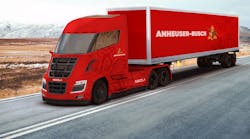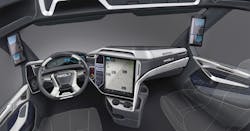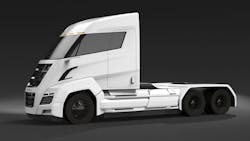Will hundreds of electric trucks hauling beer be U.S. reality in only two years?
Looking to convert its entire U.S. long-haul fleet to renewable power by 2025, Anheuser-Busch, the nation's largest brewer, has ordered "up to 800" of Nikola Motor Co.'s electric semi-trucks. The trucks are powered by hydrogen fuel cells and will have a range of 500-1,200 miles, Nikola said, and are expected to be rolling as part of the brewer's fleet "beginning in 2020."
Although a release didn't specify the breakdown of the order, an accompanying image shows a Nikola Two day cab decked out with Anheuser-Busch graphics (see above). The trucks will be able to be refueled with hydrogen in 20 minutes, according to Nikola, compared with long charge times typically required for battery-electric vehicles.
Another advantage among many the manufacturer claims vs. other trucks is the Nikola Two's "advanced surround viewing system," which displays a real-time aerial view around the truck and trailer on the truck's 15 in. touchscreen. The Nikola trucks also feature a wraparound-style windshield and side windows designed for better visibility.
"Anheuser-Busch has a long history of investing in progressive, sustainable technology, and we are proud to partner with them to bring the largest hydrogen network in the world to the USA," said Nikola CEO Trevor Milton in a statement. "By 2028, we anticipate having over 700 hydrogen stations across the USA and Canada."
Milton also appeared to allude to competing electric semi-truck maker, Tesla — the other half of the famous inventor, engineer and physicist's namesake — which in February targeted production of 100,000 of its battery-electric semi-trucks a year, calling that or greater a "reasonable expectation."
"With nearly $9 billion in pre-order reservations, we are building to order, not speculation," Nikola's Milton stated, "and [we] are very excited for what's to come."
Nikola and Anheuser-Busch said the 800 Nikola trucks will reduce the brewing company's emissions from logistics operations by more than 18%. That's part of Anheuser-Busch's goal of 25% reduced CO2 emissions by 2025 but really isn't a new concept for the company; it joined the U.S. Environmental Protection Agency's SmartWay Transport, which aims to establish higher freight efficiency, among other EPA partner programs back in 2006 and has long been active in environmentally responsible business initiatives.
For instance, the company uses a Bio-Energy Recovery Systems process at many of its breweries that pre-treats excess water from brewing and captures escaping biogas. The process converts waste nutrients into renewable fuel and reduces energy demands that would otherwise be imposed on local sewer treatment systems, according to Anheuser-Busch. The company claims to be the largest operator of such a program in the world.
"The transport industry is one that is ripe for innovative solutions, and Nikola is leading the way with hydrogen-electric, zero-emission capabilities," stated Michel Doukeris, CEO of Anheuser-Busch. He said the company wants to help drive the transportation industry forward in sustainability.
Nikola Motor Co., meanwhile, has been gearing up to build its hydrogen-electric rigs at a 1 million sq. ft. facility in Buckeye, AZ on the western side of the Phoenix metro area, with the state's Gov. Doug Ducey (R) predicting a "revolution in transportation" when it does. The trucks will handle better thanks to their battery weight creating a lower center of gravity, accelerate and stop much faster, produce no emissions, and operate more safely and at less cost than their diesel counterparts, Nikola has contended.
Of course, that won't be possible unless the hydrogen refueling infrastructure is there to support the trucks. Nikola has chosen Nel ASA to put together that hydrogen station network across the nation.
Pre-orders like Anheuser-Busch's are making the promise of electric Class 8 trucks seem more feasible rather than merely experimental, and Nikola appears to be going about things in carefully managed, systematic fashion. And so far, the best chance to emerge for real duty cycles of Class 8 electric trucks on America's roadways — not just drayage or short-distance operations, but long haul and regional haul — is looking like hydrogen fuel cell electric vehicles.





